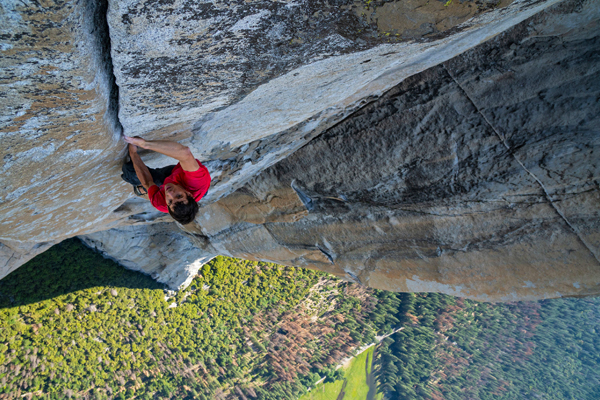
Free Solo star Alex Honnold talks about fear, freedom and fame
Tom Robbins writing for the Financial Review met with Alex Honnold, star of Free Solo, the day after the BAFTAs – and wrote the following story:
Free Solo star Alex Honnold talks about fear, freedom and fame
After a decade of living in a van, getting moved on by security guards, surfing on other people’s Wi-Fi and eating dinner straight from the saucepan, life for Alex Honnold is suddenly a little different. In a smart hotel in London’s West End, his huge climber’s hands fumble with a silver tea strainer. “Hold on, what’s this thing for?” he says in a soft Californian lilt. “I just started drinking green tea like a week ago – seems classy, you know?”
Honnold, 33, is the most famous climber alive, right now the biggest star in the wider world of adventure and extreme sport, celebrated for cheating death on pioneering ascents made without a rope or safety net of any kind. He has 1.1 million followers on Instagram and for fans represents something far beyond athleticism. “In a world of BS artists – and in a country led by one – Honnold is modelling something else, a kind of radical truthfulness,” wrote The New York Times in an opinion piece last year.
Yet he is nothing like the macho action heroes of old. In his film, Free Solo, and in the flesh, he comes across as intellectual yet unworldly – thoughtful, boyish and a little vulnerable. Maybe it’s his doe-eyes, big ears and thick black hair in constant need of a comb, but I feel a distinct urge to give him a hug. I help him with the strainer, then he lifts the cloche on a huge plate of smoked salmon. “Look at all this. Oh, my goodness! I started eating fish in the last couple weeks too. It’s all a big experience.”

Van life has been left behind while Honnold spends six months promoting Free Solo. We meet on the morning after the Baftas, where it won best documentary and where, in a dinner jacket as new as his taste for tea, he was lauded by celebrities and royalty. He seems dazzled. “We met the prince and princess. They were just so … so stately! It was actually surprisingly moving.” The following weekend Free Solo won the Academy Award for Best Documentary Feature.
None of this is normal: climbing films usually count success as a moderately packed community hall. Free Solo has been playing in multiplexes and Imaxes around the world. When I saw it in London last month, Honnold gave a Q&A and was then mobbed in the foyer like a pop star. It is hard to think of the last time climbing has crossed so much into the mainstream consciousness – perhaps not since Everest in 1953. Meanwhile a boom in city-centre indoor walls is creating a new generation of climbers and the sport makes its Olympic debut next year. Apparently Prince George is practising moves around Kensington Palace.
Films and books about climbing, mountaineering, any kind of adventure in fact, have always borrowed their impact from death. The (often hammed up) moment of jeopardy gives the dramatic climax, while the implied danger throughout lends depth and meaning, lifting mere sport to a more philosophical plane. In this film, the risk of death could not be more real or more urgent. It documents Honnold’s unprecedented 2017 ascent of Freerider, a route up El Capitan, the iconic 1000-metre granite cliff in Yosemite – a climb done “free solo”, meaning alone and with no rope. A single slip, a rock falling from above, a broken handhold, and he’d be dead. Whereas conventional rock climbing can seem unfathomable (the techniques, nomenclature, numerous grading systems) this has a brutal, binary simplicity.”Imagine an Olympic-gold-medal-level athletic achievement that if you don’t get that gold medal, you’re going to die,” says Tommy Caldwell, a leading climber and a friend. No one has ever tried free soloing something as hard as Freerider before, yet many others have found themselves missing out on medals. “Everyone who has made free soloing a big part of their life is dead now,” says Caldwell.
Audiences hold their breath and emerge sweaty palmed. They witness Honnold’s girlfriend crumbling – “why do you want to do this?” she weeps – while for the camera crew, tangled up with the ethical dilemma of whether their presence is egging him on, it is possibly even more harrowing. “It’s hard to not imagine your friend falling through the frame to his death,” says Jimmy Chin, the co-director.
So does falling loom large in Honnold’s own mind? “People always ask me about death and fear but that’s kind of missing the point a little bit,” he says. “If I were thinking about death the whole time I was on the wall, I probably wouldn’t climb. It just wouldn’t seem that fun.”
El Cap, the goal he had dreamed of for a decade, is in the bag; his other big targets were all ticked off as he prepared for it. Yet the “dark magic” of climbing without a rope clearly still pulls at him. Late last year he was driving through California on his way to a screening when he pulled over and “just ran up a couple of things by myself”.
Source
Tom Robbins
Financial Review
Have a story to tell or news to share
Let us know by submitting a news story, an article, a review, a white paper and more …
Submit

